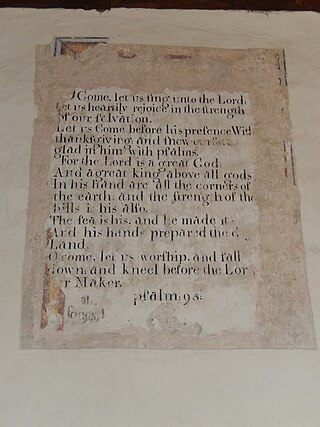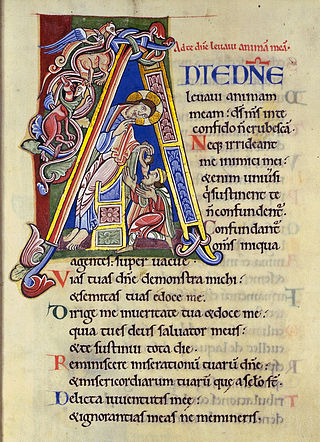Dance is present in mythology and religion globally. Dance has certainly been an important part of ceremony, rituals, celebrations and entertainment since before the birth of the earliest human civilizations. Archeology delivers traces of dance from prehistoric times such as the 5,000-year-old Bhimbetka rock shelters paintings in India and Egyptian tomb paintings depicting dancing figures from c. 3300 BC.
"Joy to the World" is an English Christmas carol. It was written in 1719 by the English minister and hymnwriter Isaac Watts, and its lyrics are a Christian reinterpretation of Psalm 98. The carol is usually sung to an 1848 arrangement by the American composer Lowell Mason.

A metrical psalter is a kind of Bible translation: a book containing a verse translation of all or part of the Book of Psalms in vernacular poetry, meant to be sung as hymns in a church. Some metrical psalters include melodies or harmonisations. The composition of metrical psalters was a large enterprise of the Protestant Reformation, especially in its Calvinist manifestation.

Psalm 119 is the 119th psalm of the Book of Psalms, beginning in the English of the King James Version: "Blessed are the undefiled in the way, who walk in the law of the Lord". The Book of Psalms is in the third section of the Hebrew Bible, the Khetuvim, and a book of the Christian Old Testament. The psalm, which is anonymous, is referred to in Hebrew by its opening words, "Ashrei temimei derech". In Latin, it is known as "Beati inmaculati in via qui ambulant in lege Domini".

Psalm 23 is the 23rd psalm of the Book of Psalms, beginning in English in the King James Version: "The Lord is my shepherd". In Latin, it is known by the incipit, "Dominus regit me". The Book of Psalms is part of the third section of the Hebrew Bible, and a book of the Christian Old Testament. In the slightly different numbering system used in the Greek Septuagint and Latin Vulgate translations of the Bible, this psalm is Psalm 22.

Psalm 137 is the 137th psalm of the Book of Psalms in the Tanakh. In English it is generally known as "By the rivers of Babylon", which is how its first words are translated in the King James Version of the Bible. Its Latin title is "Super flumina Babylonis".

Psalm 95 is the 95th psalm of the Book of Psalms, beginning in English in the King James Version: "O come, let us sing unto the LORD: let us make a joyful noise to the rock of our salvation". The Book of Psalms starts the third section of the Hebrew Bible, and, as such, is a book of the Christian Old Testament. In the slightly different numbering system in the Greek Septuagint version of the Bible, and in the Latin Vulgate, this psalm is Psalm 94. In Latin, it is known as "Venite exultemus" or simply "Venite". The psalm is a hymn psalm, one of the Royal psalms, praising God as the King of His people. Psalm 95 identifies no author, but Hebrews 4:7 attributes it to David. The Vulgate also names David as the author.

Psalm 30 is the 30th psalm of the Book of Psalms, beginning in English in the King James Version: "I will extol thee, O LORD; for thou hast lifted me up". The Book of Psalms is part of the third section of the Hebrew Bible, and a book of the Christian Old Testament. In the slightly different numbering system used in the Greek Septuagint version of the Bible and in the Latin Vulgate, this psalm is Psalm 29. In Latin, it is known as "Exaltabo te Domine". It is a psalm of thanksgiving, traditionally ascribed to David upon the building of his own royal palace.

Psalm 92 is the 92nd psalm of the Book of Psalms, beginning in English in the King James Version: "It is a good thing to give thanks unto the LORD". In the slightly different numbering system used in the Greek Septuagint and Latin Vulgate translations of the Bible, this psalm is Psalm 91. In Latin, it is known as "Bonum est confiteri Domino ". The psalm is known as Mizmor Shir L'yom HaShabbat, is ostensibly dedicated to the Shabbat day.

Psalm 149 is the 149th psalm of the Book of Psalms, a hymn as the book's penultimate piece. The first verse of the psalm calls to praise in singing, in English in the King James Version: "Sing a new song unto the Lord". Similar to Psalm 96 and Psalm 98, Psalm 149 calls to praise God in music and dance, because he has chosen his people and helped them to victory. Psalm 149 is also marked by its martial tone: it calls on the people to be ready to fight.

Psalm 126 is the 126th psalm of the Book of Psalms, beginning in English in the King James Version: "When the Lord turned again the captivity of Zion, we were like them that dream". In Latin, it is known as In convertendo Dominus. It is one of the fifteen Songs of Ascent in the Book of Psalms whose opening words in Hebrew are "Shir HaMaalot". In the slightly different numbering system used in the Greek Septuagint version of the Bible and in the Latin Vulgate, this psalm is Psalm 125.

Psalm 3 is the third psalm of the Book of Psalms, beginning in English in the King James Version: "Lord, how are they increased that trouble me!". In Latin, it is known as "Domine quid multiplicati sunt". The psalm is a personal thanksgiving to God, who answered the prayer of an afflicted soul. It is attributed to David and relates in particular to the time when he fled from his son Absalom.

Psalm 25 is the 25th psalm of the Book of Psalms, beginning in English in the King James Version: "Unto thee, O LORD, do I lift up my soul.". The Book of Psalms is part of the third section of the Hebrew Bible, and a book of the Christian Old Testament. In the slightly different numbering system used in the Greek Septuagint and Latin Vulgate translations of the Bible, this psalm is Psalm 24. In Latin, it is known as "Ad te Domine levavi animam meam". The psalm, attributed to David, has the form of an acrostic Hebrew poem.

Psalm 33 is the 33rd psalm of the Book of Psalms, beginning in English in the King James Version: "Rejoice in the LORD, O ye righteous: for praise is comely for the upright". The Book of Psalms is part of the third section of the Hebrew Bible, and a book of the Christian Old Testament. In the slightly different numbering system used in the Greek Septuagint and Latin Vulgate translations of the Bible, this psalm is Psalm 32. In Latin, it is known by the incipit, "Exultate iusti in Domino". Its purpose is to praise "the Sovereignty of the Lord in Creation and History".

Psalm 136 is the 136th psalm of the Book of Psalms, beginning in English in the King James Version: "O give thanks unto the LORD; for he is good: for his mercy endureth for ever. ". The Book of Psalms is part of the third section of the Hebrew Bible, and a book of the Christian Old Testament. In the slightly different numbering system used in the Greek Septuagint and Latin Vulgate translations of the Bible, this psalm is Psalm 135. In Latin, it is known by the incipit, "Confitemini Domino quoniam bonus". It is sometimes referred to as "The Great Hallel". The Jerusalem Bible calls it a "Litany of Thanksgiving". It is notable for the refrain which forms the second half of each verse, translated as "For His mercy endures forever" in the New King James Version, or "for his steadfast love endures for ever" in the Revised Standard Version.

Psalm 122 is the 122nd psalm of the Book of Psalms, beginning in English in the King James Version: "I was glad" and in Latin entitled Laetatus sum. It is attributed to King David and one of the fifteen psalms described as A song of ascents. Its title, I was glad, is reflected in a number of choral introits by various composers.

Psalm 96 is the 96th psalm of the Book of Psalms, a hymn. The first verse of the psalm calls to praise in singing, in English in the King James Version: "O sing a new song unto the Lord". Similar to Psalm 98 and Psalm 149, the psalm calls to praise God in music and dance, because he has chosen his people and helped them to victory. It is one of the royal psalms praising God as the King of His people.

Psalm 99 is the 99th psalm of the Book of Psalms, beginning in English in the King James Version: "The LORD reigneth; let the people tremble". The Book of Psalms starts the third section of the Hebrew Bible, and, as such, is a book of the Christian Old Testament. In the slightly different numbering system in the Greek Septuagint version of the Bible, and in the Latin Vulgate, this psalm is Psalm 98, beginning "Dominus regnavit". It is the last of the set of additional Royal Psalms, Psalms 93-99, praising God as the King of His people. There is no title in the Masoretic text version, but the Septuagint provides a title: "A psalm of David".

Psalm 111 is the 111th psalm of the Book of Psalms, beginning in English in the King James Version: "Praise ye the LORD. I will praise the LORD with my whole heart". In the slightly different numbering system used in the Greek Septuagint and Latin Vulgate translations of the Bible, this psalm is Psalm 110. In Latin, it is known as Confitebor tibi Domine. It is a psalm "in praise of the divine attributes". This psalm, along with Psalm 112, is acrostic by phrase, that is, each 7-9 syllable phrase begins with a letter of the Hebrew alphabet in order. Psalm 119 is also acrostic, with each eight-verse strophe commencing with a letter of the Hebrew alphabet in order. The Jerusalem Bible describes Psalm 112, "in praise of the virtuous", as "akin to this psalm in doctrine, style and poetic structure.
"10,000 Reasons " is a worship song co-written by the English Christian singer-songwriter Matt Redman and the Swedish songwriter Jonas Myrin, first recorded by Redman for his 10,000 Reasons album, released in 2011 on Kingsway Music, and subsequently included on a number of compilations, covered by other artists and included as congregational worship music in English or in translation around the world. In 2013, the song won two Grammy Awards for "Best Contemporary Christian Music Song" and "Best Gospel/Contemporary Christian Music Performance". After the song's success and impact, Redman also published a book: 10,000 Reasons: Stories of Faith, Hope, and Thankfulness Inspired by the Worship Anthem.
















